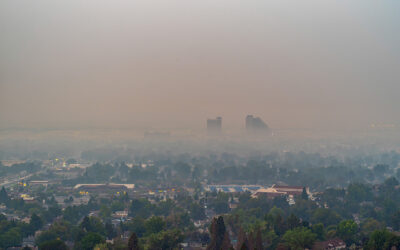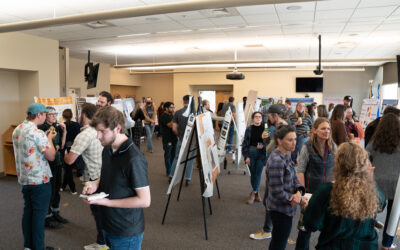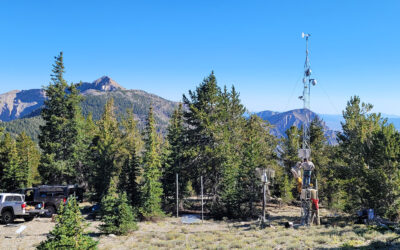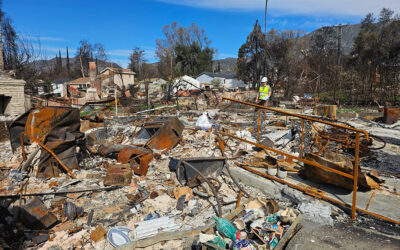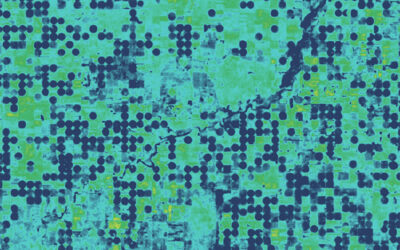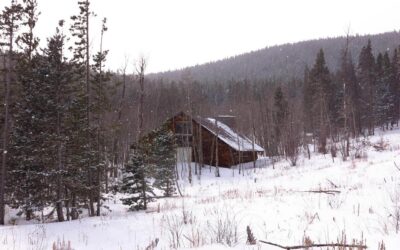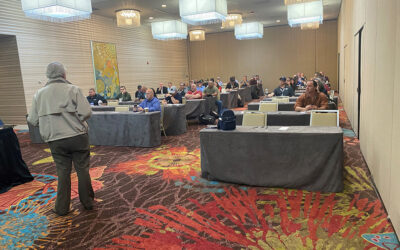The comprehensive research examined air quality in Reno, Nevada during 106 wildfires to illuminate the atmospheric and public health impacts of smoke. The research, published in April’s issue of Environmental Science: Atmospheres, measured air quality in Reno, Nevada over a 19 month period between 2017 and 2020 to capture both smoky and clear days.
Posts by Elyse DeFranco
Graduate Student Winners of the Annual Poster Presentation Session
On Friday, April 25th, 21 graduate students presented their research at DRI’s Reno campus for the annual poster presentation session. Organized by Kathleen Rodrigues, PhD, Assistant Research Professor of Luminescence, the poster session offers an opportunity for DRI-affiliated graduate students to network with each other and with DRI faculty, hone their presentation skills, and showcase the research they’re working on in pursuit of their degrees.
Long Science in the Nevada Bristlecone Preserve
Ancient bristlecone pines have been collecting data for us for millennia. Anne Heggli’s research aims to provide a nearly microscopic look at how the climate in the Great Basin is changing, from hour to hour and season to season. With scientific monitoring equipment positioned from the floor of the Great Basin’s Spring Valley up to the peak of Mount Washington, her project examines temperature fluctuations, atmospheric information, and snowpack insights across the region’s ecosystems.
Meet Cayenne Engel
Cayenne Engel, M.Sc., is a Staff Research Scientist in urban climate adaptation who joined DRI in September 2024. Based at DRI’s Las Vegas campus, she is dedicating her time to assessing and expanding the region’s urban tree canopy to bring relief to communities burdened by temperatures that regularly soar above 100° Fahrenheit. In the following interview, Engel shares her passion for public service-oriented research, how Nevada’s unparalleled landscape lured her west, and her love for intricate puzzles.
DRI Holds Water Panel at Nevada State Legislature
On March 27, DRI scientists gathered at the State Capitol to illuminate work that supports Nevada’s communities and landscape. With more than 600 scientists, engineers, students, and staff across our Reno and Las Vegas campuses, we conducted more than $52 million in sponsored research focused on improving peoples’ lives in 2024 alone.
What’s in the Burnt Remains of the LA Wildfires?
DRI scientists deployed to Los Angeles to collect ash, soil, and dust samples from burn zones in the hopes of illuminating the unique risks of wildland-urban fires. These urban fires presented a unique opportunity to understand how materials like plastics, metals, and even lithium batteries from electric cars can transform into environmental contaminants when they burn.
OpenET’s New CEO, Sara Larsen, Discusses the Future of the Revolutionary Water-Monitoring Initiative
OpenET, a nonprofit initiative focused on improving water management with accessible, satellite-based evapotranspiration (ET) data, has welcomed Sara Larsen as the new CEO. DRI sat down with Sara to discuss what makes the initiative unique, her plans for the organization, and how OpenET can help address the biggest challenges in water management.
New Study Finds Rocky Mountain Snow Contamination
An examination of Rocky Mountain snow finds higher contamination levels of mercury and others metals in the northern part of the range, consistent with increased current and historical mining in the region. The study, published in the May issue of the journal Environmental Pollution, examined contamination levels for Mercury, Zinc, Cadmium and Antimony from nearly 50 sites in the Rocky Mountains.
Blurring the Line Between Rain and Snow: The Limits of Meteorological Classification
A new study published in Nature Communications utilizes insights gleaned from DRI’s Mountain Rain or Snow project to evaluate why traditional weather forecasting struggles to identify the rain/snow transition line. The research was possible because thousands of community members across the U.S. contributed more than 40 thousand observations of the type of precipitation falling at their location.
DRI Scientists Work to Protect Miner Health and Safety Across Nevada
To help protect miners and assist mine managers in reducing hazardous exposures, DRI scientists Xiaoliang Wang, Judy Chow, and John Watson are conducting free trainings to raise awareness about health risks and effective protection methods. Data from the Mine Safety and Health Administration (MSHA) show that as much as 27% of miners are overexposed to air contaminants.
